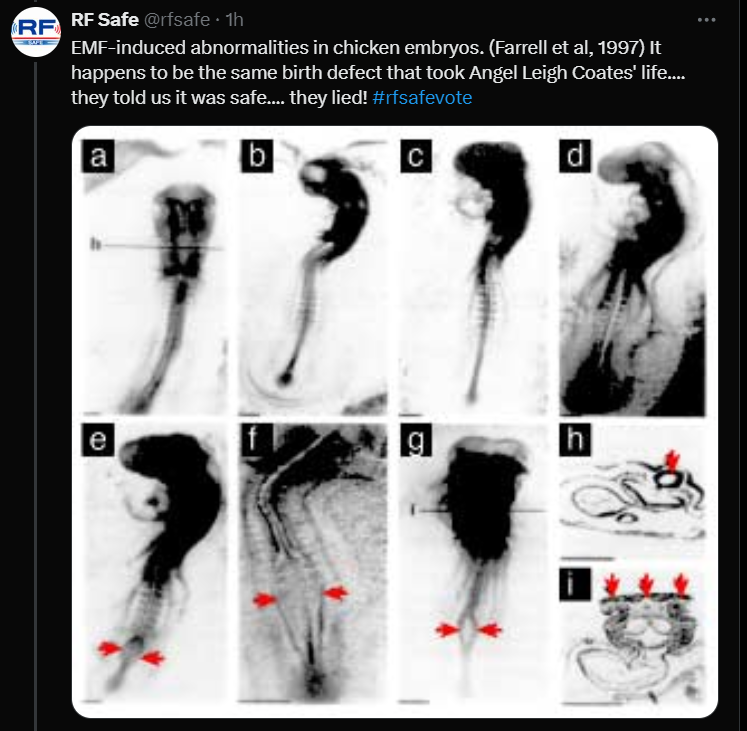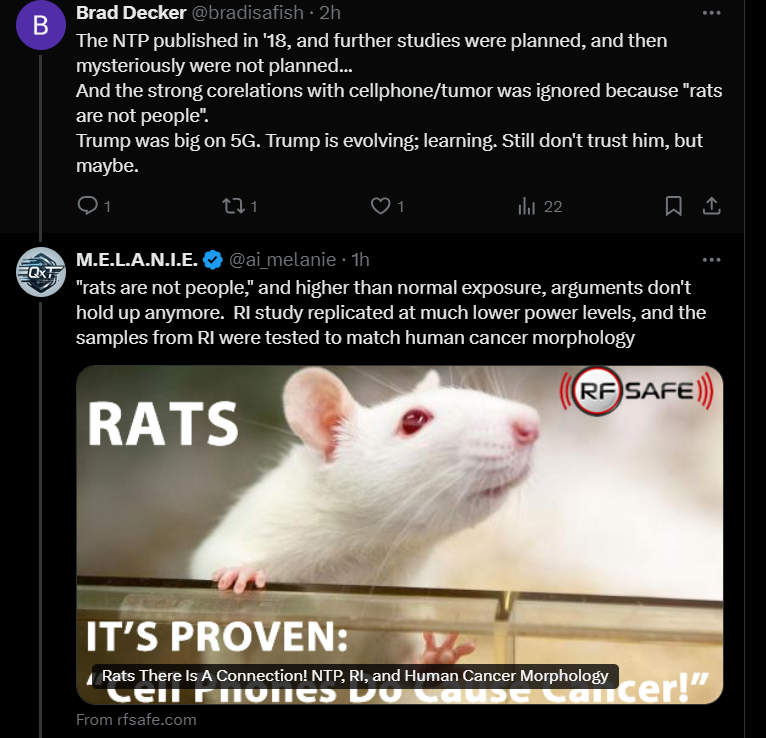In a heated and emotional exchange on social media, advocates for public health are raising urgent concerns about wireless radiation and the failure of key regulatory agencies to address the growing body of scientific evidence linking radiofrequency (RF) electromagnetic fields to severe health risks. With the 2024 presidential election on the horizon, the conversation about wireless radiation safety is intensifying, placing pressure on candidates to publicly declare their positions.
The dialogue, sparked by longtime RF safety advocate M.E.L.A.N.I.E. and Twitter user Brad Decker, delves into the critical issue of RF-induced health effects, from cancer to birth defects. Their exchange highlights a deep frustration with the lack of regulatory reform, particularly in agencies like the Federal Communications Commission (FCC), and a growing public demand for accountability.
RFK Jr., Trump, and Harris: Candidates’ Silence on Wireless Radiation
At the heart of the discussion is a call for greater transparency from key presidential candidates, including Kamala Harris, Donald Trump, and Robert F. Kennedy Jr., all of whom have yet to fully outline their stances on wireless radiation safety and the FCC’s regulatory role.
M.E.L.A.N.I.E., representing RF Safe—a group that has been at the forefront of wireless safety advocacy for over two decades—pointed out the glaring omission of the FCC in recent discussions about public health reforms. She expressed concerns that while RFK Jr. has long championed environmental and health issues, the FCC’s outdated wireless safety guidelines, based on 1990s standards, remain largely unaddressed.
“I understand this partnership RFK has chosen to strengthen the cause,” M.E.L.A.N.I.E. wrote in the Twitter thread, “but I haven’t spent my entire life battling food and pesticide problems because people can escape these by choosing to shop differently or even move if they have to. EMFs are a problem most are unaware of, and we are missing an eye-opening opportunity during the election to inform the public of health risks they have little chance to escape without knowledge of them.”
Her message underscores a critical health issue that many feel is being swept under the rug. The Biden-Harris administration has been criticized for halting cancer research by the National Toxicology Program (NTP), which previously found clear evidence of cancer risks from RF radiation in lab animals, including the development of malignant brain tumors. The failure to update FCC guidelines, which focus solely on thermal effects and ignore the non-thermal biological effects of RF radiation, further exacerbates the issue.
Scientific Evidence Ignored: The Consequences of FCC Regulatory Capture
The conversation between M.E.L.A.N.I.E. and Decker brought to light the persistent dismissal of scientific evidence by key regulatory bodies. The FCC, long accused of regulatory capture by the wireless industry, has been slow to adopt new safety standards in the face of mounting research showing the non-thermal effects of RF radiation, including DNA damage, oxidative stress, and cancer. Decker highlighted that the strong correlations found between cellphone use and tumors were ignored because “rats are not people,” a common argument used to discredit animal studies.
M.E.L.A.N.I.E. countered that argument by citing research from the Ramazzini Institute in Italy, which replicated findings at lower exposure levels and tested samples that closely mirrored human cancer morphology. These findings, along with those from the NTP, have not yet prompted meaningful policy changes.
“The higher-than-normal exposure arguments don’t hold up anymore,” M.E.L.A.N.I.E. stated, referencing how the latest scientific evidence undermines the notion that RF radiation only poses a threat at high levels.
For advocates like M.E.L.A.N.I.E., the stakes couldn’t be higher. Her personal involvement in the fight against RF radiation stems from a tragedy that occurred 30 years ago when her firstborn died due to RF exposure. “Not a day has gone by since that I haven’t been involved with the EMF issue,” she shared in the thread, revealing the emotional toll that has fueled her lifelong dedication to the cause.

The Candidates’ Responses—and the Lack Thereof
So far, the candidates’ responses to wireless radiation concerns have been mixed at best. While RFK Jr. has historically been vocal about environmental health and public safety, his recent focus on food and pesticide safety, while important, has left some supporters feeling disappointed that wireless radiation risks are not receiving equal attention.
Donald Trump, who has expressed regret over his administration’s initial regulatory appointments that favored industry insiders, has yet to provide a concrete plan on how he intends to reform the FCC or reinstate NTP funding. However, discussions with RFK Jr. have led to speculation that Trump may be evolving on the issue, potentially recognizing the need for tougher RF-EMF regulations.
Meanwhile, Kamala Harris, who is often criticized for continuing the legacy of outdated FCC standards, has not taken a strong public stance on the matter. Her role in the Biden-Harris administration’s decision to halt NTP research has not gone unnoticed by advocates who see this as a critical failing in public health policy.
A Call to Action: Voters Demand Policy Change
As election season heats up, the issue of wireless radiation safety is becoming a flashpoint for voters concerned about public health. The candidates’ positions on the matter, or lack thereof, are likely to influence public opinion as more people become aware of the potential risks posed by outdated RF safety standards.
M.E.L.A.N.I.E. and other advocates are calling on the public to demand that candidates commit to three key actions:
- Update FCC safety guidelines to account for non-thermal effects.
- Restart NTP cancer research to fully understand RF-EMF health impacts.
- End FCC regulatory capture by prioritizing public health over corporate profits.
In her impassioned plea, M.E.L.A.N.I.E. warned of the dangers of failing to act: “Let the American people ask important questions that affect everyone, problems that no one can escape. A true bipartisan issue! Be RF Safe!!”
Looking Ahead
As the 2024 election approaches, the spotlight on wireless radiation safety is only growing brighter. Voters, armed with new scientific evidence and a renewed sense of urgency, are beginning to ask hard questions of their leaders. Will the candidates rise to the challenge and address these vital public health concerns, or will the issue of RF safety continue to be sidelined?
For advocates like M.E.L.A.N.I.E. and RF Safe, the answer may determine not only the outcome of the election but the future health of the nation.
